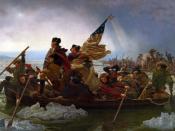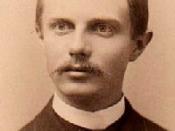One must decide the meaning of "progressive historiography." It can mean either the history written by "progressive historians," or it can mean history written by historians of the Progressive era of American history and shortly after. The focus that was chosen for this paper is more in keeping with the latter interpretation, if for no other reason than it provides a useful compare-and-contrast "control" literature.
The caveat is this: the focus of this report is on the predominant question of the historiographical period: was the war a revolution or a war for independence? One could choose many other questions to argue, questions that historians have for years disputed about the revolution, but there are a number of reasons why this report was chosen for this particular assignment; the two best follow. First, it is an old and time-honored question that professors and instructors have posed to their students for years; of pre-Civil War historiographical questions, it is perhaps second only in fashion during the last twenty to twenty-five years to the Jefferson-Hemmings paternity controversy.
Second, the revolution-or-independence question is one of those which must be answered through interpretation. A case cannot be made that is so utterly conclusive as to exclude all others; it is that very fact that makes history at once so frustrating and so fascinating. What better way could there be to look at the writings of a specific school of historians? Therefore, in the pursuit of "personal truth," we must proceed...
Perhaps the most famous of all progressive historians is Frederick Jackson Turner. His most famous argument is not devoted strictly to the American Revolution, but instead to the effects of the American frontier. In a sentence, his argument is that the frontier was the chief determinant in American history.
This is not to say that...


